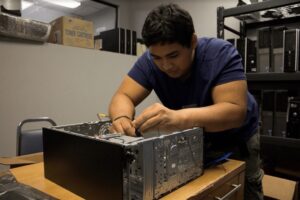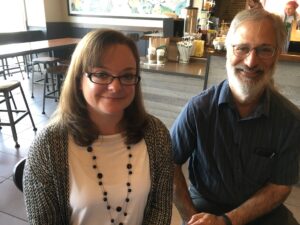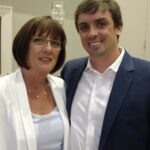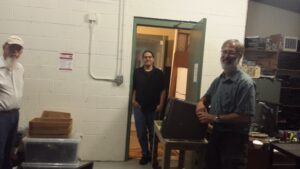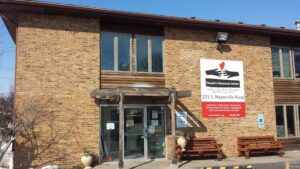Free Geek Partner Profile – March 2022
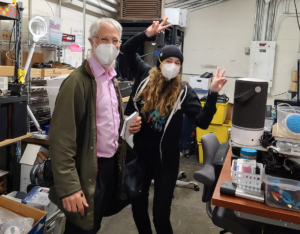 Adelle Pomeroy from Free Geek met Barry and Maryanna at Free Geek’s facility in Portland, Oregon in February, 2022. The facility was preparing to reopen to volunteers on the following day, after being closed for an extended period due to COVID-19 restrictions. Since Free Geek has a culture of inclusive decision-making as documented in their origin story, each department was responsible for a turn following the strict sanitation regime required during COVID.
Adelle Pomeroy from Free Geek met Barry and Maryanna at Free Geek’s facility in Portland, Oregon in February, 2022. The facility was preparing to reopen to volunteers on the following day, after being closed for an extended period due to COVID-19 restrictions. Since Free Geek has a culture of inclusive decision-making as documented in their origin story, each department was responsible for a turn following the strict sanitation regime required during COVID.
Free Geek’s mission is to sustainably reuse technology, enable digital access, and provide education to create a community that empowers people to realize their potential. They aim to include everyone in the digital future. The computers granted to Digital Inclusion participants are saved from landfills. They help provide digital literacy skills to the community’s most vulnerable populations. Thus, Free Geek matches excess electronic waste in need of sustainable reuse and recycling with the lack of access to basic technology among vulnerable populations.
Computers 4 Kids
For 13 years Computers 4 Kids in West Sacramento, California has been recycling, refurbishing, and repairing computers. Through dedicated volunteer time and talent, they have distributed over 2000 computers. They became a PBDD partner in 2015. The photo is courtesy of Computers 4 Kids.
Maryanna Milton recently spoke with Kristin Winters because we were curious to hear how their work has been going. Very often smaller non-profits do tremendous work with very few resources and a few very motivated volunteers/part time staff. Computers 4 Kids is no exception.
Learning to be the light – May 2019
While teaching high-school juniors at Sunday school, Robin Schultz discovered that one of his students didn’t have a computer at home. Since he had access to used computers through his computer-consulting business, he placed one in his student’s home. Realizing that other students also didn’t have computers, he started Learning To Be The Light http://www.learningtobethelight.org in 2011 with Olivia Lenamond. Its mission is to ensure that eligible students in Hoover City, Alabama have the technological resources needed to succeed in today’s high-tech school environment.
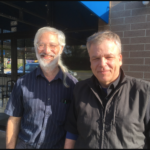 We met with Robin Schultz from Learning To Be The Light (LTBTL) at a Starbucks in Hoover, Alabama. What was clear within a few minutes of conversation was how passionate Robin Schultz is about schooling, as evidenced by his continued high level of involvement with the local school board, which made the original location of the building used for their refurbishing extra-special. For years, LTBTL used part of the space for Artists on the Bluff which was located in what used to be an elementary school, one that Robin’s wife and his daughter had attended. When the building was going to be leveled, a local group proposed renting the building and using it to form an artist community.
We met with Robin Schultz from Learning To Be The Light (LTBTL) at a Starbucks in Hoover, Alabama. What was clear within a few minutes of conversation was how passionate Robin Schultz is about schooling, as evidenced by his continued high level of involvement with the local school board, which made the original location of the building used for their refurbishing extra-special. For years, LTBTL used part of the space for Artists on the Bluff which was located in what used to be an elementary school, one that Robin’s wife and his daughter had attended. When the building was going to be leveled, a local group proposed renting the building and using it to form an artist community.
LTBTL agreed to maintain the internet for Artists on the Bluff in exchange for a room.
Digital Bridge – March 2019
Digital Bridge began in 2009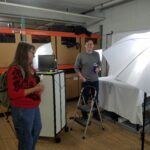 by Dan Pastori and Jeff Hanson as Project Community Computers, a student organization at the Milwaukee School of Engineering (MSOE). Digital Bridge has since grown into an independent, nonprofit organization headquartered in the Walker’s Point neighborhood of Milwaukee. In January, we met with Executive Director and founder, Jeff Hanson, and toured the facility.
by Dan Pastori and Jeff Hanson as Project Community Computers, a student organization at the Milwaukee School of Engineering (MSOE). Digital Bridge has since grown into an independent, nonprofit organization headquartered in the Walker’s Point neighborhood of Milwaukee. In January, we met with Executive Director and founder, Jeff Hanson, and toured the facility.
San Diego Futures Foundation – January 2019
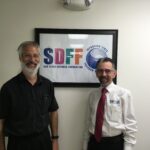 San Diego Futures Foundation (SDFF) provides technology equipment, training, support, IT outsourcing, electronics recycling and digital media services to nonprofit organizations, disadvantaged small businesses, low-income households, people with disabilities, and seniors in San Diego County. It was started in 1999 as the County of San Diego moved IT and telecommunications services online. Barry and I met with Gary Knight, the Executive Director on a recent trip to San Diego. We had visited him almost a year ago, and had also talked with Gary at the 2018 NDIA Net Inclusion conference, which we had recommended to him. Of special interest to our partners may be SDFF’s work with the visually impaired, their excellent writeup of volunteer positions, and their coding boot camps.
San Diego Futures Foundation (SDFF) provides technology equipment, training, support, IT outsourcing, electronics recycling and digital media services to nonprofit organizations, disadvantaged small businesses, low-income households, people with disabilities, and seniors in San Diego County. It was started in 1999 as the County of San Diego moved IT and telecommunications services online. Barry and I met with Gary Knight, the Executive Director on a recent trip to San Diego. We had visited him almost a year ago, and had also talked with Gary at the 2018 NDIA Net Inclusion conference, which we had recommended to him. Of special interest to our partners may be SDFF’s work with the visually impaired, their excellent writeup of volunteer positions, and their coding boot camps.
P2PU – Peer 2 Peer University
 Over the years, one benefit of computer access in the home has been the resources of free on-line training. There are so many classes on so many topics, much of it free. It’s a wonderful opportunity. But only if people actually finish classes that they are interested in. Learning circles, or peer-to-peer learning, provides the support of a traditional classroom for participants to study as a group. It’s a great idea, going back thousands of years, but how to get started?
Over the years, one benefit of computer access in the home has been the resources of free on-line training. There are so many classes on so many topics, much of it free. It’s a wonderful opportunity. But only if people actually finish classes that they are interested in. Learning circles, or peer-to-peer learning, provides the support of a traditional classroom for participants to study as a group. It’s a great idea, going back thousands of years, but how to get started?
By checking out P2PU’s website at https://www.p2pu.org/
P2PU is a distributed organization, incorporated as a 501(c)3 in the United States, with the heaviest concentration of work currently in the United States, Canada, Kenya and South Africa. It was born out of the 2007 Cape Town Open Education Declaration. Founded by Philipp Schmidt, Delia Browne, Neeru Paharia, Stian Haklev, and Joel Thierstein, P2PU believed that with adequate social support, anyone can learn almost anything online for free. This strategy reached tens of thousands of learners in more than 50 countries across a number of projects and collaborations.
human-I-T April 2018
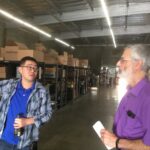 human-I-T’s goal is a world where every family has a working computer. Katherine and Barry visited their site in Los Angeles in early January where they met with Qu Chen, head technician, part of the human-I-T Team.
human-I-T’s goal is a world where every family has a working computer. Katherine and Barry visited their site in Los Angeles in early January where they met with Qu Chen, head technician, part of the human-I-T Team.
The founders, Gabe Middleton and James Jack, met while managers at Best Buy. They started Computers for a Cause in 2012 and changed the name when another organization with a similar name contacted them. human-I-T distributes technology to low-income families, veterans, disabled people, schools and nonprofit organizations. Households without computers are at a huge social and economic disadvantage. By repurposing unwanted electronic devices, human-I-T is addressing this disadvantage while also cutting down on electronic waste shipped overseas every year.
Computers 2 San Diego Kids – January, 2018
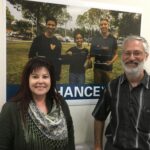 We met with Chéri Pierre, the Chief Executive Officer of Computers 2 SD Kids on January 23, 2018 in San Diego, CA. Collaboration was a strong theme of our conversation. As Chéri said, “Collaboration is good. Your organization can then be efficient in the budget, not try to do things that someone else can do better. The refurbishing industry is more collaborative than many nonprofits.” A related theme was the importance of focusing on what they do well, providing computers to low-income people in the San Diego area. Over ninety percent of the recipients of computers have very low or extremely low income levels.
We met with Chéri Pierre, the Chief Executive Officer of Computers 2 SD Kids on January 23, 2018 in San Diego, CA. Collaboration was a strong theme of our conversation. As Chéri said, “Collaboration is good. Your organization can then be efficient in the budget, not try to do things that someone else can do better. The refurbishing industry is more collaborative than many nonprofits.” A related theme was the importance of focusing on what they do well, providing computers to low-income people in the San Diego area. Over ninety percent of the recipients of computers have very low or extremely low income levels.
Computers 2 SD Kids (C2SDK) “believes all children and their families in San Diego, regardless of their economic status, need to be computer literate and have equal access to technology and the crucial educational, occupational, and financial resources that technology can provide to improve their educational options and their futures.” They distributed 22,000 computers last year. They stay focused on their program and are fiscally tight. To avoid having computers end up in local pawn shops, they charge $100 for a desktop, $200 for a laptop including one year free tech support. They provide Microsoft software on all computers, including links to free training and other resources, such as cyber security awareness and links to local food pantries. The idea is to have people use the computers as a means to access other resources in the county. As part of their technical support, if the computer can’t be fixed, or is simply requiring too many repairs, they swap it out for another one. After one year, technical support that requires a visit to c2sdk is $20, no charge for phone support. As Chéri said, “Having that technical support program guarantees to a higher decree that the computer at the end of life will come back to us.” They put reuse before recycle.
Ed Tech – November 2017
As an all-volunteer organization based in Buffalo, NY, Ed Tech of Western New York seeks to enrich the lives of children by improving access to computer technology. They set up reliable networks, WiFi, computers, smart boards, servers and other technology for community centers, schools and non-profits. Their ‘Ed Tech Days’ are eight hours or more spent on-site replacing and improving technology. By having teams focused on upgrading technology access in one day, things get done. As President Renee Cerullo said, “It is amazing. Stuff that would take a month, gets done in eight hours.”
Doug Torre started Ed Tech of Western New York in 2003 as a way for IT professionals to give back to the community. Many volunteers have been part of the program since its beginning. The board of directors are active volunteers at the Ed Tech days and board members make the initial site visits.
AZStRUT – September 2017
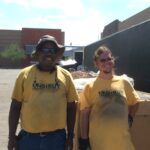 Arizona Students Recycling Used Technology (AZStRUT) has refurbished more than 56,000 computers for nonprofits and schools in Arizona in the last twenty years. Founding sponsors Intel and Motorola formed AZStRUT in 1997. Currently, over one hundred companies donate hardware at several drop off sites in the Phoenix area. Equipment that can’t be refurbished is recycled.
Arizona Students Recycling Used Technology (AZStRUT) has refurbished more than 56,000 computers for nonprofits and schools in Arizona in the last twenty years. Founding sponsors Intel and Motorola formed AZStRUT in 1997. Currently, over one hundred companies donate hardware at several drop off sites in the Phoenix area. Equipment that can’t be refurbished is recycled.
The mission of AZStRUT is to improve the competitiveness of Arizona’s Technical Workforce through:
- Supporting applied learning in our educational systems through scholarships and donated electronics & technology
- Providing refurbished equipment to education and community non-profit organizations
- Promoting diversity through technical education and work experience
- Disposing electronic waste responsibly
- Advocating responsible recycling
All equipment serves a double purpose as 500 students in more than a dozen partner schools yearly learn new skills while refurbishing the computer equipment before it is donated to schools or organizations. These “Techie Camps” introduce computer hardware, peripheral equipment, maintenance and security procedures to the participants.
TechnoCycle Community Outreach – February 2017
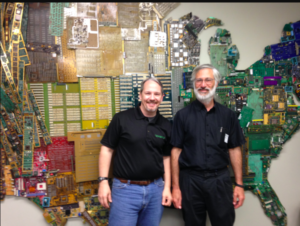
Mike and Barry in front of a US map made out of computer parts.
As an example of the valuable contributions a corporation can make to digital inclusion, this profile highlights TechnoCycle’s community outreach program which provides a free computer to incoming first graders attending Berry Elementary in North East Houston. The cost of providing internet access is underwritten by outside sponsors. Berry Elementary is an environmental science magnet school serving mostly economically disadvantaged students. The program started when Mike Buckles went to an environmental fair hosted by the school, presenting information about what TechnoCycle does. After talking with Lori Kelleher, the magnet coordinator, Mike said, “There must be more we can do together.”
Tech Boomers – December 2016
Having grown up comfortable with technology, Steve Black found himself being the authority for older relatives who wanted to learn about Facebook, Skype and Netflix. As ease-of-use became a focus of the industry, they wanted to know about all sorts of things: how to connect with friends, how to find an apartment to rent while on vacation, how to download library books to a reading device, and much more.
While Steve taught his older relatives one-on-one, they often couldn’t duplicate what he had taught them a few weeks later. Either the notes they took while learning were missing important steps or the website changed its interface. Busy with his own company, Steve didn’t have time to answer their questions so he looked for websites with tutorials for older adults to learn how to use the internet. Most content was out-of-date, glossed over important steps and confused his relatives. He wanted a set of tutorials that progressed from basic skills to more advanced features. When he couldn’t find such a website, he decided to create Techboomers.com.
LSSNF – January 2016
Lutheran Social Services of North Florida has a Computer Refurbishing & Technical Assistance (CRTA) program that provides low-cost computers in northern Florida. Katherine and Barry met with William Stone and Peter Ott in November of 2015 to talk about how our agencies might help each other.
The Computer Refurbishing and Technical Assistance program was started as a service of an existing agency when a teacher at Florida State University wanted to start a computer refurbishing program and contacted Lutheran Social Services of Northern Florida. The program refurbishes computers donated by the community and distributes them in North Florida. Potential clients come through partner referral agencies which does the recipient vetting and makes the actual request on the CRTA website. Since each request is on behalf of a specific person or family, the computer can be adapted for special use when needed.
Net Literacy – July 2015
For over ten years, the Indianapolis nonprofit Net Literacy has been run by teenagers, with the mantra of not letting well-intentioned adults get in the way of the students. Like their other programs, the summer Safe Connects internship program was suggested by the teen members of the board of directors. As the administrator put it, “Our secret sauce is the team leaders and veterans.”
Teamwork—we hear a lot about it, we know employers like experience with it, but how do economically-challenged teenagers gain potentially valuable experience in working on a team?
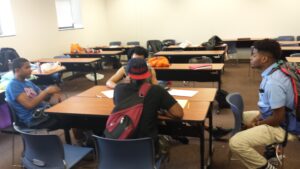
On a Thursday afternoon in July, Barry and Katherine had the opportunity to see the Safe Connects summer internship from Net Literacy (one of our partner agencies) in action. This is a six-week internship where (mainly) high-school students work in teams to produce videos on Internet Safety. In addition to learning about the consequences of online behavior, the students learn what it’s like to have a job, to work in teams, and the consequences of their actions. They are paid a stipend, and compete for bonuses for first, second, and third best video of the week.
People’s Resource Center – March 2015
The People’s Resource Center is the inspiration for, and a founding partner agency of, Partners Bridging the Digital Divide.
“Since 1975, People Resource Center has been bringing neighbors together to respond to hunger and poverty in DuPage County. With a team of over 2,000 volunteers, we offer nutritious food and other basic necessities like clothes and rent assistance for people facing tough times. And we connect people with resources–education and tutoring, jobs, technology, art, a caring community–to create a future of hope and opportunity for all.”
In the last ten years, the People’s Resource Center (PRC) has given away over 11,500 donated computers and provided free training on using those computers to clients in DuPage County, Illinois.
